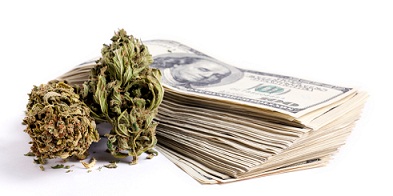Tuesday was a mixed bag for marijuana — and today showed approval of the drug’s legalization has plummeted 12 percent in the last year.
Earlier this week, voters in Alaska, Oregon and the District of Columbia approved recreational use of the drug, while voters in Florida made that state the first in about two years to reject legalization of marijuana for medical use (57 percent of Florida voters supported the measure, falling short of the 60 percent required for approval).
In Colorado, where voters have seen how regulation has worked since the state legalized marijuana for recreational use in 2012, five of seven cities entertaining questions of retail sales, including the state’s third largest, banned the shops. Voters in two cities in San Diego County, California, rejected medical marijuana dispensaries, and in four rural counties in that state, voters refused to loosen cultivation rules for medical marijuana.
Two cities in Maine split on proposals to legalize recreational marijuana use: South Portland said yes, and Lewiston, a larger college town, said no by a 10 percent margin.
Today, Gallup followed up with a poll showing only 51 percent of Americans support marijuana legalization — down 7 percentage points (or 12 percent) since 2013. The poll showed 47 percent of Americans oppose legalization. The poll’s margin of error is +/- 4 points, Gallup said. The drop reported today by Gallup is in line with another major national poll. Earlier this year, the Public Religion Research Institute found national support for legalized marijuana has fallen from 51 percent in 2013 to 44 percent in 2014.
“It’s clear that marijuana legalization is not inevitable,” said Kevin Sabet, the former senior drug policy advisor to the White House who co-founded Smart Approaches to Marijuana to push for policy reforms associated with marijuana use, but not legalization of the drug.
Marijuana-legalization campaigns, funded mostly by organizations whose chief donor is billionaire George Soros, far outmatched anti-legalization efforts — and that’s a gross understatement. In Alaska, Oregon and D.C., pro-pot campaigns raised a combined $9 million — most of it coming from Soros-funded groups — while campaigns working against the drug’s legalization raised a combined total of $400,000 that came mostly from state residents.
Considering the multimillion-dollar budget they were up against, Oregonians who volunteered to lead the anti-legalization campaign in their state said they were heartened that 46 percent of voters sided with them.
“Millions of out-of-state dollars were spent on ads that were false or misleading or omitted pertinent information,” said Mandi Puckett, a lifelong Oregonian who directed the No on 91 campaign, which was up against a campaign chiefly funded by the George Soros-fueled Drug Policy Action, a group based in New York that is pushing for full-scale drug legalization. “Oregonians are now contacting us about sections of Measure 91 they didn’t understand or didn’t realize,” Puckett added. “We’ll continue our work to educate about marijuana’s harms and the consequences of this measure.”
The consequences of marijuana legalization are already seen in Colorado and Washington, which legalized the drug two years ago. Data adapted from the Washington State Patrol find that the year after marijuana legalization, the number of traffic cases involving a driver who tested positive for delta-9 THC (the active ingredient in marijuana) increased by 33.3 percent (the number had fallen by 7.9 percent the previous year). At Children’s Hospital Colorado, doctors treated from January through July 2014 12 children exposed to the drug.
“If the resources to educate the public were evenly matched, our country would say no to pot,” Sabet said.
Marijuana’s threats to health and safety are poorly understood, and Americans are “voting without the knowledge,” said Dr. Nora Volkow, director of the National Institute on Drug Abuse, when she spoke Feb. 4 in Washington, D.C., to hundreds of people attending the 24th Annual National Leadership Forum of the Community Anti-Drug Coalitions of America (CADCA).
“These are extremely important times because we are faced with one of the greatest challenges we’ve observed in terms of the patterns of drug use in our country,” she said. “This is the first time in a long, long time where we have a drug that has consistently been illegal now made legal. Those drugs that are most frequently used are the ones that are legal- and that is not because they are the most pleasurable or the best drug.”
Of the 2.4 million Americans who try marijuana for the first time each year, nearly 60 percent are under the age of 18, Volkow said. This is especially concerning because those young people are in stages of crucial brain development that make them especially vulnerable to developing substance addiction.
We invite you to review Volkow’s full remarks:



I can appreciate the sentiment, however, the midterms presented a continuing momentum for marijuana legalization. Florida did get a significant majority and I assume that bill will be written again for 2016.
Always interested to see outcomes and perceptions of those outcomes. Legalization is not about the drug. It’s about culture and that is a difficult thing to adjust.
Thanks much for the note. We like to say, “Legalization’s biggest enemy is legalization” — and voters in five other Colorado cities appear to agree. So, while, sure, a couple of states and D.C. approved legalization, it’s hard to ignore that millions of dollars chiefly contributed by one billionaire were plowed into those places.
More people are catching on to the degrees to which these marijuana policies are influenced and bought — and they don’t like what they see. Just as they don’t like to see hash oil explosions, marijuana-related traffic fatalities, people toking in public and behind the wheels of cars, the neglected kids of marijuana users, marijuana on school campuses …
After we posted today, Gallup released its latest poll about the nation’s sentiments about marijuana. Support for the drug’s legalization has dropped 12 percent in just the last year. We invite you to read more about that.